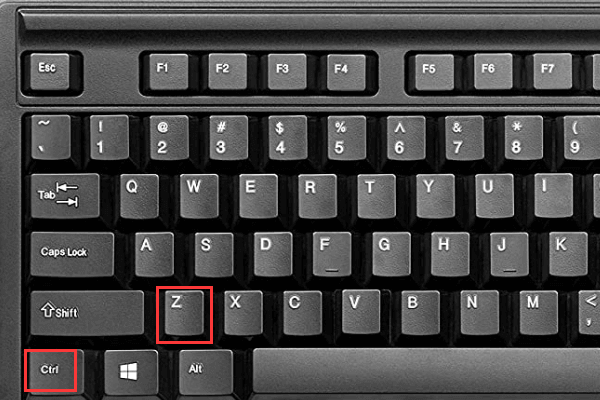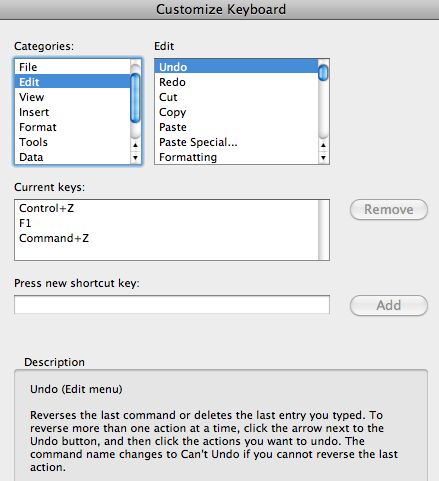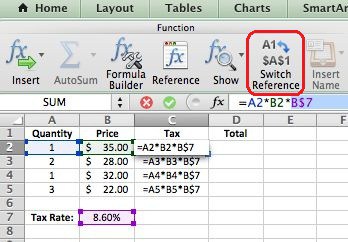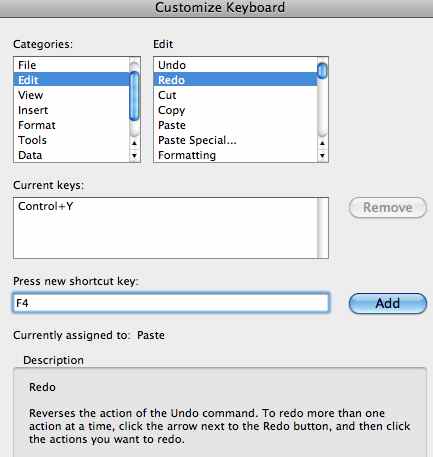

To get to this dialog, select the cells you want to align, and then either:
#Change mac shortcuts for excel how to#
How to align text in Excel using the Format Cells dialogĪnother way to re-align cells in Excel is using the Alignment tab of the Format Cells dialog box. To simplify things further, Microsoft Excel will display all alignment shortcuts for you as soon as you press the Alt + H key combination: A + T - "align top", A + L - "align left", A + C - "center alignment", and so on. In the second key combination, the first letter is always "A" that stands for "alignment", and the other letter denotes the direction, e.g. The first key combination ( Alt + H) activates the Home tab. To change alignment in Excel without lifting your fingers off the keyboard, you can use the following handy shortcuts:Īt first sight, it looks like a lot of keys to remember, but upon a closer look the logic becomes obvious. If you have gone too far right, click the Decrease Indent icon to move the text back to the left. To move text further to the right, click the Increase Indent icon.

To change the indentation of the cell contents, use the Indent icons that reside right underneath the Orientation button.

In Microsoft Excel, the Tab key does not indent text in a cell like it does, say, in Microsoft Word it just moves the pointer to the next cell. These options come in especially handy for labeling narrow columns: Align Right - aligns the contents along the right edge of the cell.īy combining different vertical and horizontal alignments, you can arrange the cell contents in different ways, for example: Align to upper-leftĬlick the Orientation button on the Home tab, in the Alignment group, to rotate text up or down and write vertically or sideways.Center - puts the contents in the middle of the cell.Align Left - aligns the contents along the left edge of the cell.To align your data horizontally, Microsoft Excel provides these options: Please note that changing vertical alignment does not have any visual effect unless you increase the row height.

#Change mac shortcuts for excel windows#
If you press Command+Tab, highlight an app’s icon, then push the up or down arrow, you will launch a mode that shows thumbnails of all that app’s open windows on the screen. There are other things you can do with the Command+Tab switcher. Exposing Open Window Thumbnails with Command+Tab Once you’ve highlighted the app you want to switch to, release Command+Tab and the app will be brought into the foreground. Or you can press Command+Tab and use the left- and right-arrow keys to select an app. You can also hold down Command+Shift and tap “Tab” to move the selection cursor in the opposite direction-from right to left. If you hold the Cmd key down while tapping the Tab key, the cursor will move between the icons from left to right. A row of app icons will appear in the center of your screen. If you’d like to quickly switch between open apps on a Mac, press Command+Tab. This feature has been in Windows since Windows 2.0 in 1987, and macOS has a similar shortcut. In the world of Windows, many users are familiar with a feature often called “Task Switcher” that allows you to quickly switch between open applications by pressing Alt+Tab.


 0 kommentar(er)
0 kommentar(er)
